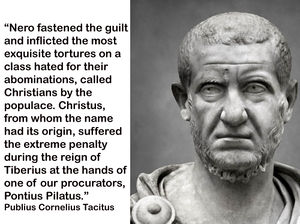Template:Jesus real

Denial of Christ
There are a lot of people that leap at the idea that Jesus was completely made up and never existed.
The scholar Bart Ehrman who has written a number of critical books on modern christian ideas and biblical interpretations into a scholarly context of history says people who suggest that Jesus never existed "Just make themselves look silly." But then he is the same guy who said “The Christians did not invent Jesus. They invented the idea that the messiah had to be crucified.”
He wrote the book "Did Jesus Exist?" in which he wrote:
- “The problem then with Jesus is that he cannot be removed from his time and transplanted into our own without simply creating him anew.”[1]
Ehrman is not alone in his errors. Those who are suggesting that Jesus did not exist have been popping up like tares in a wheat field.
Just as the masses in those early days hated the doctrine of Jesus so did their masters.
Many today hate Jesus but if we want to understand why He provoked such hatred then we only need to hold His teachings up to the light.[2]
Many modern Christians might hate the idea and those who share the truth that they are under a Strong delusion about their own faith and are actually the very workers of iniquity Jesus and His followers warned us about.
The real problem is the more doctrines modern Christians invent the less they seem to know about the real Jesus and the less they know about the real Jesus the more they give the real Jesus a bad name.
Historical Jesus
Religious movements with no grounding in reality whatsoever and real historical events are almost none existent. Yet, thousands of people were dying and being persecuted, having their property seized and their bodies dismembered and even set on fire. What was driving them?
They would not partake of the free bread and welfare of the Roman State which was at the core of the Christian conflict with Rome and even with the Pharisees and their Corban.
During times of economic failure, famines, and "dearths" the early Christians would not eat at the "tables" of the Roman State and were often mercilessly persecuted for that choice. That is a lot to expect from followers who had no Bible, no Churches and a supposedly made up founder.
Did any independent historian talk about Jesus?
Of course, Paul has two brief meetings with Jesus’ brother James. Since James’ existence could have been verified to the readers of Paul it would have been foolish to make him up.
Josephus
Josephus was a Roman-Jewish historian who supposedly wrote the Testimonium Flavianum—an ‘early’ reference to Christ. Some, however, think it is fake. But Josephus’s works also include a much less known passage that is not disputed.
In Book 20 of his Antiquities of the Jews there is a clear reference to the execution of “the brother of Jesus, who was called Christ, whose name was James”.
Tacitus

Publius Cornelius Tacitus was a senator and a historian of the Roman Empire.
The Great Fire of Rome was talked about extensively by Tacitus clearly mentions Christ and His movement that was hated by the masses.
Tacitus wrote of his suspicions that the fire was set and then blamed on a "class hated for their abominations, called Christians". He also mentions the name of the man they followed identified as "Christus". He even makes reference to this Christus' death by torture during the "reign of Tiberius at the hands of one of our procurators, Pontius Pilatus”.
Tacitus at the risk of his own life wrote of a government coverup in his Annals 15.44 :
"Consequently, to get rid of the report, Nero fastened the guilt and inflicted the most exquisite tortures on a class hated for their abominations, called Christians by the populace. Christus, from whom the name had its origin, suffered the extreme penalty during the reign of Tiberius at the hands of one of our procurators, Pontius Pilatus.”
There has been clear evidence from many authors like Tacitus who went on to complain about this superstition.
"and a most mischievous superstition, thus checked for the moment, again broke out not only in Judaea, the first source of the evil, but even in Rome, where all things hideous and shameful from every part of the world find their centre and become popular."
Both the term translated religion and superstition had to do with religion. The former from the Greek :threskia meaning what you do and the latter was what you think.
Something about what Christians thought triggered Romans and Pharisees.
This could because Romans and Christian respectively called Caesar and Jesus the Son of God.
They both called their respective kings their Savior. The both provided free bread at their tables of welfare.
The difference was that early Christians provided their daily ministration for their needy through faith, hope and, fervent charity while Romans and Pharisees depend upon systems of legal charity through the rule of force, fear, and fealty.
The Way of those followers of "Christus" was called pure Religion because it was unspotted by the Public Religion of the world of Rome.
Many Christian Jews had been exiled from Rome under Claudius.[3]
This exile was because jealousy and envy among the "masses" had caused riots and unrest which was the result of a sort of "Christus" derangement syndrome due to their own appetite for benefits and the habit of obtaining through force.
They had long been degenerating into perfect savages as predicted by Polybius 200 years earlier.
Now Tacitus now writes of a true Holocaust.
"Accordingly, an arrest was first made of all who pleaded guilty; then upon their information, an immense multitude was convicted, not so much of the crime of firing the city, as of hatred against mankind."
This hatred has been seen in the prison camps, in the Russian gulag, and Chinese reeducation camps.
Mockery of every sort was added to their deaths. Covered with the skins of beasts, they were torn by dogs and perished, or were nailed to crosses, or were doomed to the flames and burnt, to serve as a nightly illumination, when daylight had expired."
Why would someone even suggest there is no evidence that Jesus the Christ was real?
Why did the masses hate Him and His followers and would the masses today hate real Christian if they were actually doing what the early Church did?
Archaeological evidence
Was there archaeological evidence that Christ existed?
What is the meaning of archaeological evidence?
The archaeological record is the body of physical (i.e. not written) evidence about the past. It is one of the core concepts in archaeology, the academic discipline concerned with documenting and interpreting the archaeological record.
What we usually call archaeological record are usually found in the ground.
What would you expect to find as an archaeological record of Jesus?
We know that James was Jesus brother and that he lived and we appear to have found his bone box. The Ossuary or bone box immediately came into question and the Israeli police arrested the collector who found Ossuary on the suspicion of forgery.
But the case was thrown out because those experts who were making these accusations were evidently lying and the inscriptions appear to be authentic.
The Ossuary or bone box of Caiaphas the high priest was also found containing bones and for some unknown reason also contained three spikes that could have been used in a crucifixion.
There are apparent discrepancies in the book we call the Bible but these do not affect the message of the Gospel. The ancient prophecy saying the Messiah would be born in Bethlehem begs why was he from Nazareth in Mark and only later from Bethlehem in Luke and Matthew.
Jesus's Mother having stayed in Bethlehem during the birth may make Jesus a prophetic anchor baby but he would still be from the polis of Nazareth. Even Herod Antipas' Mother went to Bethlehem to give birth to little Herod just so he could improve his claim to the throne.
- ↑ Bart D. Ehrman, Did Jesus Exist?: The Historical Argument for Jesus of Nazareth
- ↑ John 3:20 For every one that doeth evil hateth the light, neither cometh to the light, lest his deeds should be reproved. 21 But he that doeth truth cometh to the light, that his deeds may be made manifest, that they are wrought in God.
- ↑ Acts 18:1 After these things Paul departed from Athens, and came to Corinth; 2 And found a certain Jew named Aquila, born in Pontus, lately come from Italy, with his wife Priscilla; (because that Claudius had commanded all Jews to depart from Rome:) and came unto them.